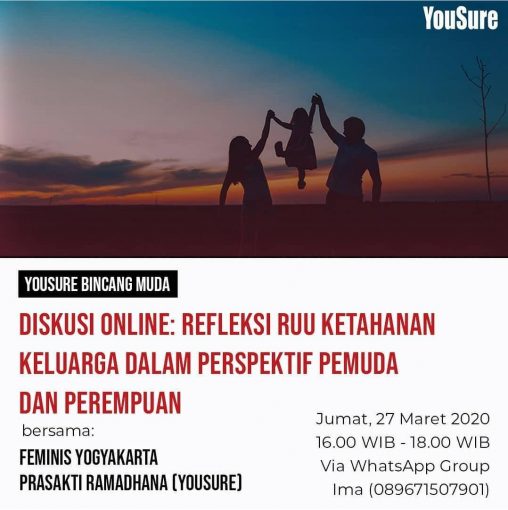
Yogyakarta, 27th March 2020 — Youth Studies Center or YouSure Fisipol held another Bincang Muda (The Youth Talk) discussion. YouSure’s online Bincang Muda discussion’s topic was ‘Reflection of Family Resilience Bill from the Youths and Women’s Perspectives’, it was held online through WhatsApp Group. The participants that joined in this Bincang Muda discussion already signed up through the link that uploaded on YouSure FISIPOL’s Instagram account. The discussion was started at 06.00 p.m. and a few hours before the discussion started, the participants were contacted to join into WhatsApp Group that had been provided.
Online discussion was moderated by Magdalena Putri as the Project Officer and Research Assistant YouSure. After explaining about the rules, moderator were introduced the two speakers in this Bincang Muda online discussion, there were Dana Fahadi as the Project Officer and Research Assistant YouSure and Rosana Yuditia Ripi from Feminis Yogyakarta. Mbak Rosana Yuditia Ripi or Mbak Ripi has been active in the women and children’s movement since 2004. In the beginning, Mbak Ripi started her movement in Surabaya and this 2020 is her third year in Yogyakarta. Meanwhile, Mbak Dana Fahadi or Mbak Dana besides being a Project Officer and Research Assistant YouSure, she also teaches international class in the Communication Science Department UGM.
The moderator ignited the discussion by asking to the participants about the problems in the emergence of Family Resilience Bill. Mbak Dana responded that the biggest problem with Family Resilience Bill is the state’s intervention in the private sector, especially in regulating the role of husband and wife. When in fact, each family has a different condition and needs, therefore it cannot be likened to one another. Mbak Ripi also added that, there are many articles that are gender biased because they clearly regulate the role of men and women which sourced from patriarchal culture. Where in fact, patriarchal culture has long been opposed by women’s movement in Indonesia.
Mbak Ripi then explained about gender issues that become the main problem in Family Resilience Bill. In social order, there is a division of roles, which used to be called as gender. But the problem is that we are confronted with patriarchal culture that gives more benefits to the males, than to the females. For the example, the role of child care is only attached to women because they have the capacity to be pregnant and give birth. Mbak Dana added that in the beginning, the division of gender roles was based on the physical, with the pretext of nature as justification. Meanwhile, gender itself is a social construct.
Other than that, Family Resilience Bill also regulates other things under the pretext of fighting against nature, like LGBTQ+ and BDSM, it also uses inaccurate terminology such as free sex. According to Mbak Ripi, definition of free sex is more about free to do sex with anyone without clear consent in it. A better terminology to be used is safe sex. That way, instead of forbidding people from doing free sex, it is better to educate them about safe sex.
Family Resilience Bill also has impact to the youths. As explained by Mbak Dana, LGBTQ+ youths cannot do their role as the agents of change if they are forced to do the homosexual therapy, because it would make them trauma and it would make society resistance to them. Other than that, the youths would have difficulties in maximizing their potencies, because they should carry out the gender biased roles, like the males should protect his family, and the females should maintain the integrity of their families. Yet such tasks need the cooperation from both sides. The youths also vulnerable to become the victims of violences, such as system violence, domestic violence, and financial violence.
The discussion was closed with question and answer session, there were three questions from participants. Besides answering questions from participants, the speakers also gave the closing conclusions in the end of question and answer session. Even though the Family Resilience Bill have been rejected, but the problem about family resilience is still a big problem for the society. Other than the families, the youths, both female and male, also need to concern about this family resilience issue. We as the people in society also need to change our way of thinking about the family resilience issue, because the change is in our hands, especially the youths, as the agents of change.
